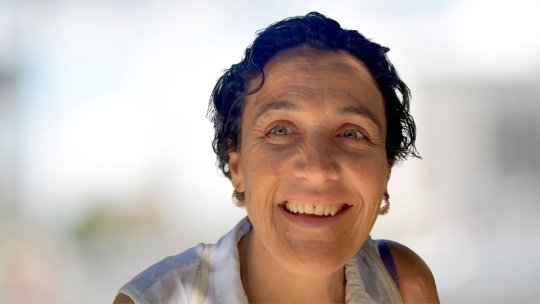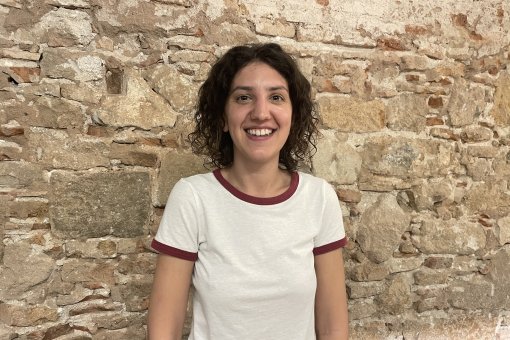Images
Contact

This month we talk to Gemma Arcalís, a regular IRB Barcelona donor. In an open and frank conversation, she gives us some insight into what drives her support of cancer research at IRB Barcelona.
Hello Gemma. Nice to meet you. Can you tell us a bit about yourself?
I am from Barcelona and I am 48 years old. I am married and I am the proud mother of teenagers Raül and Elsa. I hold a degree in Labour Relations from the Pompeu Fabra University. I work at a public agency as a business advisor.
"I think more donors should take advantage of these invitations so that they can see with their own eyes the what their donations are supporting."
Gemma, can you tell us a bit about your relationship with IRB Barcelona?
In March, my husband was diagnosed with a rectal tumour (he's doing really well and keeping our spirits high! We don't get sad!), and this October, it was my sister, Anna, who hit the "jackpot" and in her case it was breast cancer.
When something like this happens, everyone tells you not to go onto the Internet. In my family, we are very obedient and we did not go straight to the Internet for information. We talked to friends and family about what had happened, and then, one day, a few weeks after my hustanbd’s diagnosis, I saw an IRB Barcelona ad on Instagram about the experience of Pilar Ros, a mother with breast cancer metastasis. Although I didn’t want to look at anything, I was interested in her because she talked about her own personal experience. I was aware of the importance of research but never more so since my husband’s diagnosis. I signed up in April to become a regular donor to support the research at IRB Barcelona.
I have always been interested by science and research, and being aware that research is not done alone and that it requires funding, I decided to do my bit and donate.
What do you know about cancer and cancer research?
I know more about cancer than I would like to because of my husdand’s colorectal cancer diagnosis and my sister’s breast cancer diagnosis.
So over the last few months, I've learned that early detection is our ally, that a tumour doesn't develop from one day to the next, and that research saves lives... many lives... and that the more research we do, the more cancer patients will be cured.
Do you think it's important to understand how research is conducted and the advances being made? Why?
Yes. It's important to understand how research is carried out because it raises awareness of the progress made in treating diseases throughout history. Without research, we wouldn't be able to take a paracetamol when we wake up feeling under the weather, and we wouldn't have access to treatments for illnesses. Thanks to research, life expectancy has increased from 32 years in 1900 to 79 in 2000. It's said that the person who is expected to reach 120 years of age has already been born! I personally believe that we have achieved this milestone thanks to research.
But research is not just about life expectancy, it also plays a crucial role in quality of life.
Gemma, have you ever visited IRB Barcelona? Did you enjoy the visit? What did you learn?
I visited IRB Barcelona last September, on Donor Day. I got a first-hand look at the fundamental research underway in Dr. Elena Sancho’s lab, which addresses colorectal cancer and metastasis. I learned about the concept of 'cancer stem cells' and the role they play in metastasis. I also visited the Drug Screening platform, which tests compounds at an incredible speed, which was impressive. I think more donors should take advantage of these invitations so that they can see with their own eyes the what their donations are supporting.
Can you tell us why you consider it important to support research on an individual basis?
I think we take public health system for granted and we should realise that research requires a vast amount of funding.
Individual contributions, no matter how small, can collectively have a substantial impact. If each of us decides to donate a small amount, it may have little effect on our respective monthly budgets, but the total sum can greatly help advance research like that conducted at IRB Barcelona.
What would you say to people who are thinking about becoming regular donors to IRB Barcelona?
Don't overthink things! You should become a donor because the projects underway at IRB Barcelona are fantastic and—without wishing to repeat myself—because research saves lives! Today's research won't save the lives of those of us who are here now but it will save the lives of our children and grandchildren! It's an investment in future health.
About IRB Barcelona
The Institute for Research in Biomedicine (IRB Barcelona) pursues a society free of disease. To this end, it conducts multidisciplinary research of excellence to cure cancer and other diseases linked to ageing. It establishes technology transfer agreements with the pharmaceutical industry and major hospitals to bring research results closer to society, and organises a range of science outreach activities to engage the public in an open dialogue. IRB Barcelona is an international centre that hosts 400 researchers and more than 30 nationalities. Recognised as a Severo Ochoa Centre of Excellence since 2011, IRB Barcelona is a CERCA centre and member of the Barcelona Institute of Science and Technology (BIST).




